The Award-Winning Publication of the Berks County Bar Association


The Award-Winning Publication of the Berks County Bar Association



Also: Eagles Superfan always ready for some football
Bad Bunny fuels Puerto Rican Pride
Plenty of Pics: Pets, Picnics, Past Presidents and more






PETER K. HEIM
Associate Broker
Mobile: 610-745-3378
Office: 610-898-1441
PHeim@kw.com

“I

DANIEL C. NEVINS, President
PETER F. SCHUCHMAN, JR., President-Elect
ANDREW F. FICK, Vice President
JACQUELIN M. HAMER, Secretary
AMY J. LITVINOV, Treasurer
ALEXA A. ANTANAVAGE, Director
DANIEL CORTES, Director
SARA R. HAINES CLIPP, Director
JAY M. KURTZ, Director
BETH M. KOHL, Director
JESSE C. LEISAWITZ, Director
KAREN H. COOK, Immediate Past-President
MATTHEW FESSLER, President YLS
BAR ASSOCIATION STAFF
KORI A. WALTER, Executive Director
ROSE M. JOHNSON, Law Journal Secretary/Office Manager
LUCY BRITO, Community Service Manager
VALERIE KRAMER, Law Journal Editor
JACOB KRAMER, Law Journal Assistant Editor
PAMELA VANFOSSEN, Barrister Editor
Please submit materials or comments to: Berks County Bar Association 544 Court Street, P.O. Box 1058 Reading, PA 19603-1058
Phone: 610.375.4591
Fax: 610.373.0256
Email: info@berksbar.org www.berksbar.org



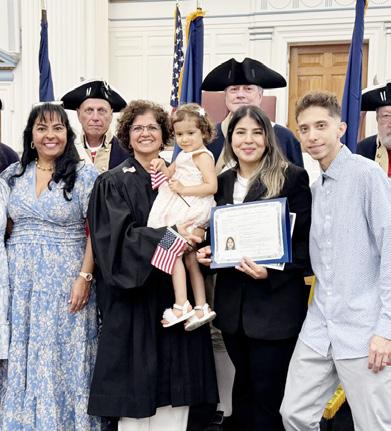
Photo: The Bar Association’s July 30
Ceremony welcomed 56 new citizens in Courtroom 5A. (Photo by Susan Angstadt)
Photo: The Hon. Eleni Dimitriou-Geishauser presided during the July 30 Naturalization Ceremony and congratulated all the new citizens, including Valentin Reyes-Veras and her family. Members of the Gov. Joseph Heister Chapter of the Sons of the American Revolution served as our Color Guard for

Daniel C. Nevins, Esquire
2025 Berks County Bar Association President

Apple TV+’s new drama series, “Dope Thief” is set in Philadelphia and based on the true story of two con men who get in over their heads with a large-scale drug trafficking organization. Naturally, an attorney figures prominently in a story line with the main protagonist.
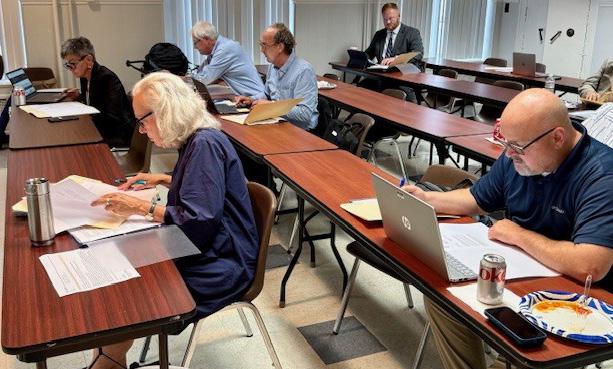
Ray, the con man with a good heart, in dialogue with Michelle, the crusading defense attorney, corrects a common misconception: Ray: That’s what Pro Bono means. I thought it meant “for free.” But it means “for good.”
Setting aside some otherwise murky ethical choices, it seems that
Michelle is performing her legal services to Ray pro bono.
Hollywood is filled with examples of attorneys performing legal services for the public good. An optimist might even say that this offsets the numerous portrayals of scheming backstabbers and morally reprehensible fixers. But in real life, we attorneys know that pro bono service is an ethical responsibility that benefits both the public good and our own professional satisfaction.
Each October the legal community in Pennsylvania celebrates Pro Bono Week, which highlights the commitment to service that we share as practicing attorneys. Berks County attorneys, with the support of our Bar Association, are instrumental in delivering for the public good in our community.


Pro

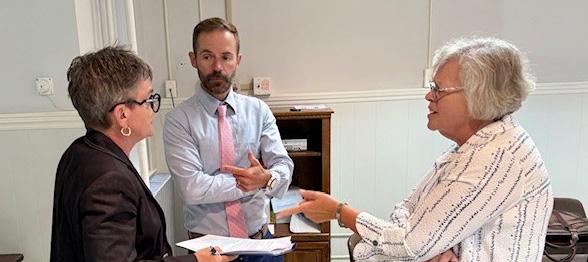
Lawyers are problem solvers. We are specifically trained to spot the issues and develop solutions within the parameters of the law and the legal system. We are also advocates who listen to our clients, understand their concerns and try our level best to get them to where they want to be. As a result, by training, experience and aptitude we are uniquely well positioned to deliver pro bono solutions to our community neighbors.
Berks County attorneys have a knack for delivering for our community:
Our first responders, law enforcement and active duty and retired military members are heroes to our community and our country that have put their lives on the line. It is critically important that these individuals, even more than most, have the benefit of estate planning for the benefit of their families. Enter the Wills for Heroes program. Started nationally following the tragic events of September 11, 2001, the Wills for Heroes program was adopted by the Berks County Bar Association in 2022. In the years since, our attorneys – led by the Young Lawyers Division – have assisted hundreds of heroes with basic estate planning documents.
The Eviction Prevention Project was conceived by Executive Director Emeritus Don Smith several years ago to provide pro bono representation to Reading tenants facing eviction actions before Magisterial District Judge Tonya Bulter. Berks County Bar Association
attorneys were crucial in providing free legal services to countless individuals, often saving families from being removed from their homes. Due to the financial limitations of most clients in this position, pro bono service provides a legal lifeline that they would otherwise be lacking.
Board Member and Villanova Law School assistant professor Daniel Cortes has spearheaded a Citizenship Clinic providing people with guidance on the naturalization process with our most recent event held on September 20. Over the years, this program, with the help of many lawyers and community partners, has guided dozens of people on their journey to United States citizenship.
The Driver’s License Restoration clinic was our latest entry to our pro bono lineup this August. Attorneys reviewed PENNDOT paperwork for drivers with suspended licenses and provided advice on steps to restoration. In our mobile society a driver’s license is often a prerequisite to employment and the means to care for one’s family. Those who cannot get to work cannot pay their bills and are often stuck in a financial vortex they cannot escape. More than 20 drivers sought our assistance in this inaugural clinic and it is my intention to continue to grow this project in the coming years.
Pro Bono service generally, and the above projects specifically, have broad support across all segments of our society. In a politically contentious time finding these areas of agreement is becoming more difficult, but support for these basic principles should cut across the ideological spectrum:
We all want people to follow the law. We expect a level playing field when appearing before the court. We support safety in our communities and want our law enforcement, military and first responders to feel that support themselves.
Pro Bono projects support these efforts. The Driver’s License Restoration clinic is an example that enjoys this type of broad support – from those enforcing the laws and those who have run afoul of law enforcement. Police officers will tell you they want motorists to be driving safely and with a valid Driver’s License. Suspended drivers will tell you they want a license in order to drive to work or school or to care for a family member. Many times the solution is simple (an unpaid traffic ticket needs to be addressed to resolve an indefinite suspension), but having the advice of an attorney can make the difference to the layperson driver and to the community.
For Berks County attorneys, engaging in pro bono service fulfills ethical obligations, strengthens the legal system, enhances professional skills, improves public perception, and provides deep personal satisfaction. In a society where legal barriers can be as daunting as the problems they are meant to resolve, the voluntary service of attorneys is essential. By dedicating their time and talents to the public good, lawyers not only transform individual lives but also contribute to a more just, equitable, and functioning democracy.


The Law Foundation of Berks County continued its annual tradition of encouraging the love of reading in the community’s youth through the Book ’Em program. Headed by volunteer JoAnn Lightman and Law Journal & Office Manager Rose Johnson, this program provides books for students in pre-k and kindergarten classes in the Reading School District. This year, each pre-k student took home Clifford’s Manners and every kindergarten student received Pete the Cat and the Cool Caterpillar after their respective book was read to their entire class
by one of our amazing attorney volunteers. This year, 46 volunteers visited 13 schools to read to 386 pre-k students in 23 reading sessions and 1,170 kindergarteners in 57 reading sessions, and because of your generosity, $6,690 was raised to be used to keep the program active for years to come. The program would not be a success year after year without the dedication of our readers and the generosity of our donors who make providing these books possible so every student can develop a joy of reading and begin building their own personal library.





Franki A. Aitken
Kurt Althouse
Alexa S. Antanavage
Honorable A. Joseph Antanavage
Raymond E. Baker
Jana Ruth Barnett
Mary Ellen Batman
Mahlon J. Boyer
K. Kenneth Brown
Eden R. Bucher
Steven D. Buck
Karen H. Cook
Debora Covell
Alfred W. Crump
Pamela A. DeMartino
Renee L. Dietrich
Colleen Dugan Schearer
Merlin & Wendy Dunkelberger
Ann E. Endres
Susan E.B. Frankowski
Honorable Madelyn S. Fudeman
Barry Groebel
Jacquelin M. Hamer
Daniel B. Huyett
Joanne M. Judge
Robert D. Katzenmoyer
Honorable Scott D. Keller
Beth M. Kohl
Joan E. Kozloff
Valerie Kramer
Brian S. Kulp
Miranda Elizabeth Lee
Jesse Craig Leisawitz
Robin S. Levengood
Howard & JoAnn Lightman
Honorable James M. Lillis
Paul L. Marrella
Heidi B. Masano
Kenneth Millman
Frederick & Denise Mogel
John E. Muir
Kenneth C. Myers
Daniel C. Nevins
Alison Palmer
John Perate
Charles Phillips
Jesse L. Pleet
James M. Polyak
William F. Roberts
Honorable Jill M. Scheidt
Peter F. Schuchman, Jr.
Wendy Sharetts
Donald F. Smith, Jr.
James M. Snyder
Deborah A. Sottosanti
Jospeh R. Speece, III
Honorable Jeffrey K. Sprecher
Honorable Mary Ann Ullman
Stephen G. Welz
Gregory R. Young
Deborah Zonies
Curran Estate & Elder Law
Masano Architects Group
Sodomsky & Nigrini
White Star Tours - Chris Kraras

Joseph R. Speece, III, led a lunchtime walking tour on May 29 through one of Reading’s most unique neighborhoods, The Centre Park Historic District. Speece, a Berks County assistant district attorney, pointed out the various architectural styles, weaving in historical facts about the area and the magnificent mansions built by Reading’s industrial barons. The City of Reading has enacted ordinances to maintain the character of the homes and formed the Centre Park Historic District in 1982 to oversee preservation efforts.

Berks Bar members on the walking tour were: (Front row from left) Bar President Dan Nevins and Stacey Lindsay. (Back row from left) Tour leader Joseph R. Speece, III; Bar President-Elect Pete Schuchman; Jay Kurtz; Bar Vice President Andy Fick; Aaron Bell; and the Hon. Jill M. Scheidt.

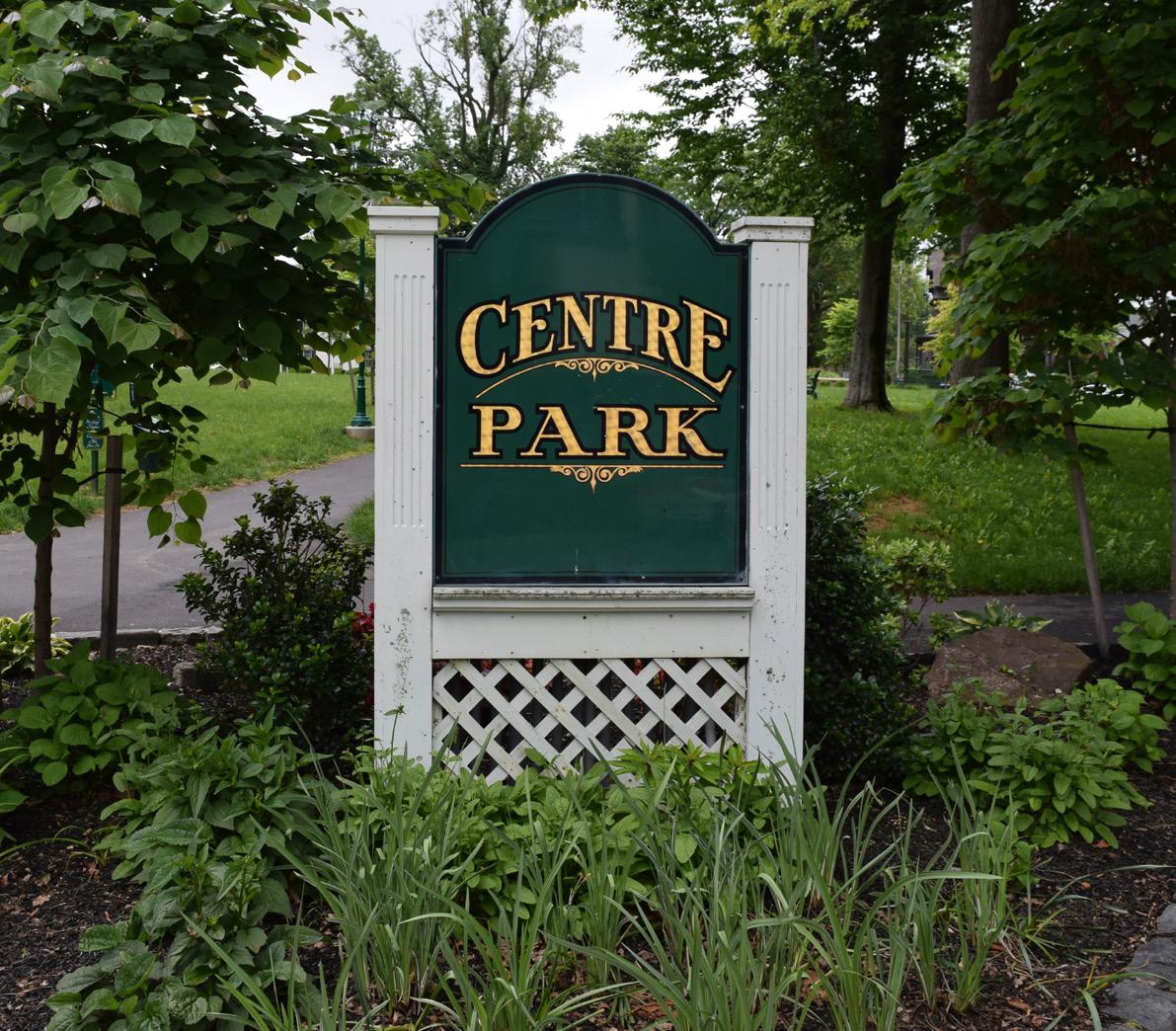

The Historic John P. Feeney Residence is the first home in Reading to have an elevator, which can carry up to four people between the first and second floors. Before the Feeney family converted this mansion into a funeral home, Mary Nolan lived in the home. Mary was the eldest daughter of railroad tycoon James Nolan. She married Edward Dives, whose family founded the Dives, Pomeroy & Stewart store.
Aaron Bell, second from left, grew up in the 900 block of North Fourth Street in Centre Park.





The Berks History Center at the corner of Centre Avenue and Spring Street was dedicated on October 1, 1929. It was designed to be fireproof to protect the irreplaceable collection of archives and artifacts, which date back to 1898 when The Historical Society of Berks County began gathering items.


Swanona Mansion was built in 1891 by James H. Carpenter, the founder of Carpenter Technology Corporation. The main mansion is nearly 9,000 square feet and is built in a Queen Anne/Italianate style. It is now home to Centre Park Law Offices owned by Berks Bar Member Scott Hoh.
Stacey
By Matthew Fessler, Esquire

Irecently had the pleasure of representing the Berks County Bar Association at the Pennsylvania Bar Association Young Lawyers Division Summer Summit. The event was a threeday summit at the Camelback Resort in Tannersville, Monroe County, beginning the evening of July 30. The event opened with Matt Holliday, the Executive Director of the PBA, giving a brief presentation on the ins and outs of the PBA and how attorneys can take advantage of and be involved with the benefits the PBA has to offer. Such advantages include the opportunity to join numerous specialized committees and sections, participate in social events, and gain access to publications issued by the PBA. This presentation was followed by several social and networking opportunities which were the cornerstone of the summit. Following a social hour, a buffet dinner was held where the PBA’s Young Lawyer Chair Adrianne Sipes encouraged the attendees to make the most of the opportunity being offered to establish connections with attorneys from across the state that they normally would not have the opportunity to speak to. The night ended with a fireside social, which offered live music, smores, and plenty of opportunities to socialize. Fortunately, the weather held up all night and offered a memorable evening.
The next day started with another chance to network at a breakfast buffet, where I had the opportunity to speak with young attorneys from across the state, ranging from
Montgomery County to Allegheny County, and a couple all the way from Erie County. This day was the prime day for the attendees to earn CLE credits, with multiple offerings throughout the day. The first class I attended was on understanding the financial aspects of legal practice, which discussed details regarding IOLTA accounts, liability insurance policies and related information that, while a standard part of practicing law, is one that many young lawyers have little experience with and are generally unprepared to deal with. My next class was on alternative dispute resolution. The presentation highlighted the now commonplace nature of “alternative” dispute resolution, and how attorneys can use these opportunities and advice as to how to benefit from them.
The day still offered chances to network and socialize. During a scheduled free time, the PBA offered a number of activities that attendees could participate in. I elected to participate in a hiking trip through the Pocono Mountains. The trip was organized by PBA President-Elect James Antoniono, who in the past successfully hiked the Appalachian Trail. He discussed his experience, provided entertaining anecdotes, and the lessons he took away from such an undertaking. The day ended with cocktails and dinner at the scenic Summit House. As always, the dinner offered plenty of socializing and networking opportunities.

The next and final day started with another breakfast buffet followed by an ethics CLE on the topic of ethical challenges in the early years of practice. This provided an overview of attorney competency, the attorney-client relationship, and the termination and withdrawal of a matter when such action becomes necessary. The last and final presentation was a CLE presented by President Judge Anne E. Lazarus and President Judge Jack A. Panella of the Superior Court of Pennsylvania. The presentation was on appellant advocacy, and advised attendees on the operation of the Superior Court, tips for success on appeal, the importance of brief writing and the do’s and don’ts of appellant practice.
The three-day summit offered good educational lessons, which were catered specifically to young attorneys. More importantly, it offered the rare opportunity to network with young lawyers throughout the state and in various practice areas. The event offered the chance to speak with more experienced attorneys who were willing and happy to share their experiences and plenty of new attorneys who are going through similar learning experiences as the other attendees and were willing to share what they have found to work for them in their practice. I would definitely recommend the opportunity to any young attorney who is able to attend.
Mr. Fessler is the 2025 Young Lawyers Section President and an attorney at the Wyomissing firm Hartman, Valeriano, Magovern and Lutz.



By Benjamin Primack

As an undergraduate junior at Boston University studying Business and Psychology, this summer I had the privilege of interning in the Reading office of MidPenn Legal Services (MidPenn), under the supervision of attorney Angélica Matías. My time at MidPenn has provided me with insight into the daily work of an attorney. This internship has been invaluable to help me explore my interest in the legal profession.
MidPenn is a nonprofit public interest law firm that provides legal assistance to low-income residents in Berks County in several areas of law. The two predominant areas of law that I observed and familiarized myself with during this internship were Protection from Abuse and Landlord/Tenant cases. Starting with client intake and screening, I observed our support staff to learn the types of questions and procedures that a law firm uses when taking on clients. I quickly noticed the importance of asking clear and concise questions to identify the key legal issues and decide whether the client qualified for our services.
I also observed and assisted on initial interviews with clients. Before clients arrived, I prepared the client’s file with documents needed such as intake forms, retainer and pleadings, and any lease documents or rent payment logs for eviction cases. It was my responsibility to come into these meetings prepared by having reviewed the file. For example, during a meeting with the client, while the attorney asked the client questions and instructed me on how to complete the document, I drafted the Answer to the Complaint. During these learning moments, my supervisor always paused to explain concepts like jurisdiction, court procedure, discovery, and evidentiary rules. With a combination of drafting
legal documents and sidebar teaching from my supervisor, I truly learned so much about civil litigation and the law in general. I realized that later in the summer, when I started a class on business law, I had a clear grasp of civil law concepts discussed in class, having seen them in action.
Another key part of my internship was conducting legal research and writing closing letters to clients. For example, I conducted research related to the Protection from Abuse Act, for a case that was being appealed to the Superior Court. For that case I was able to review the transcript to know what happened in court and reviewed the brief to learn what were the issues complained about on appeal, which was great to learn about appellate procedure. Another time, one of the clients was not provided with a version of court documents in Spanish, so I went on the Unified Judicial System of Pennsylvania website and found the “Translation Policy and Procedures Manual” that states the responsibilities of the courts in Pennsylvania to translate court documents for Limited English Proficient court users. These hands-on experiences allowed me to hone my research skills and gain knowledge about the law that I would never have had otherwise.
I also assisted attorneys by drafting closing letters to clients. If I had any questions about legal terms like supersedeas rent payments or burden of proof, my supervisor would define these and give me real-world examples. Writing these letters taught me to be concise and identify the key legal issues, the services provided to clients, and the outcome of the case. As I have learned, using clear, precise language is an essential skill for attorneys to

into my future career.
Undeniably, my favorite part was observing court procedures. Around three times a week, I would go to court and see firsthand how the process works. First, we would find our client and walk into the courtroom with them, making sure they knew where to go and what to expect. Next, I would observe the attorney talk to opposing counsel to see if there was willingness from the opposing party to reach an agreement, and I watched how attorneys interact and negotiate to get a favorable outcome for both their clients. Watching these interactions gave me meaningful insight into the different skills needed as an attorney: preparation, patience, and professionalism. During the actual procedures, I was able to observe how attorneys present evidence, ask questions during direct testimony, and cross-examine the opposing party. Many times, attorney Matías would introduce me to the judge, and I had many conversations about becoming an attorney and different law career paths I could follow.
Looking back, my internship was truly amazing! I can’t express how grateful I am to have had such a valuable learning opportunity that I will draw on and learn from in hopes of becoming an attorney.









On the morning of June 24, over two dozen summer interns from many Berks Bar members’ offices stopped by the Bar Association building for our first Summer Intern Coffee & Conversation. The interns, who are either enrolled in undergrad or law school across the country, had the opportunity to meet other interns, attorneys, and Bar leaders and staff. President Dan
Nevins explained the benefits of membership with the Bar Association and the impact the members make in the community every year. He also encouraged the interns to come back to Berks County to begin their legal careers and become full members of the Bar Association.







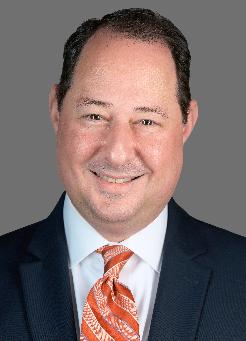


Our

The tradition of bringing the Berks County Bar Association’s Past Presidents together for an evening of catching up and reminiscing continued on June 4th at Dans at Green Hills. Turnout was excellent with 24 Past Presidents in attendance. Current Bar President Daniel C. Nevins toasted his presidential peers, thanking each for their dedication to building a vibrant bar association.

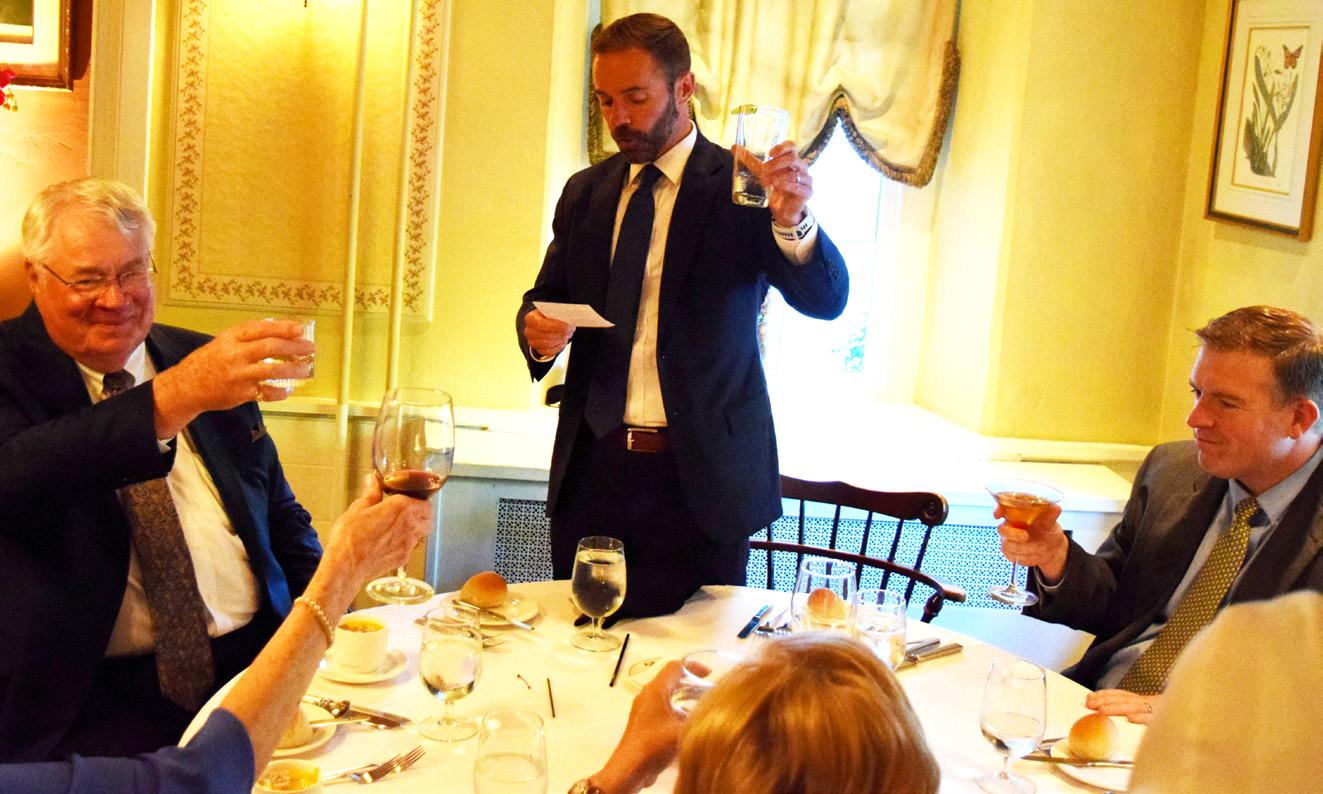
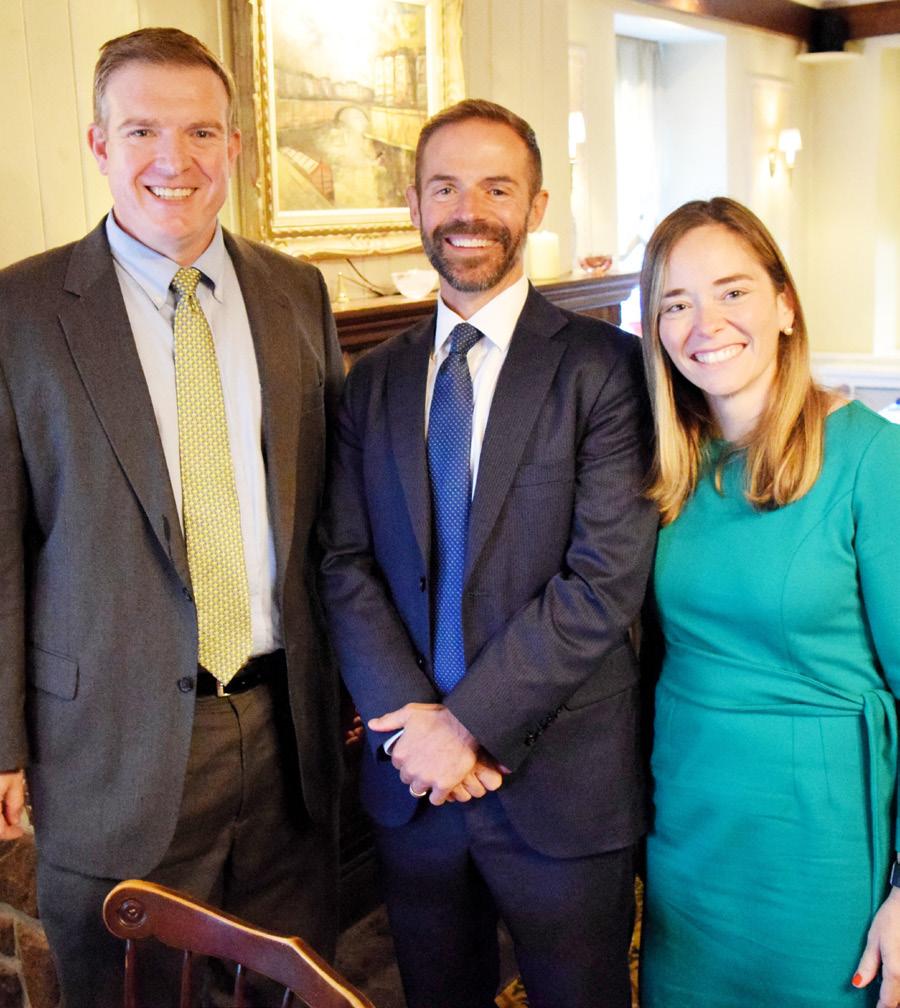
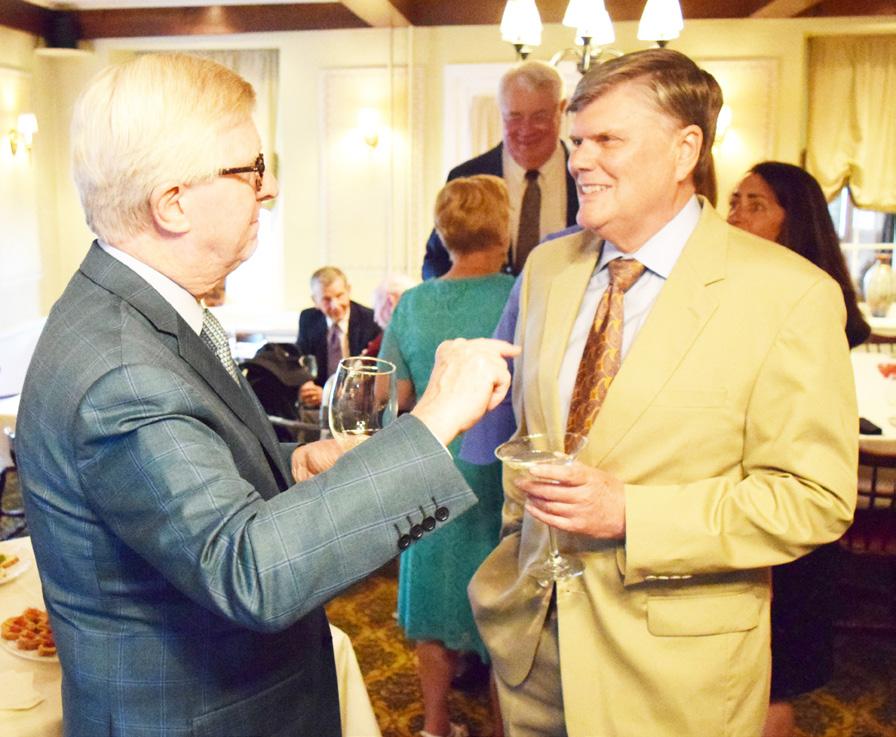

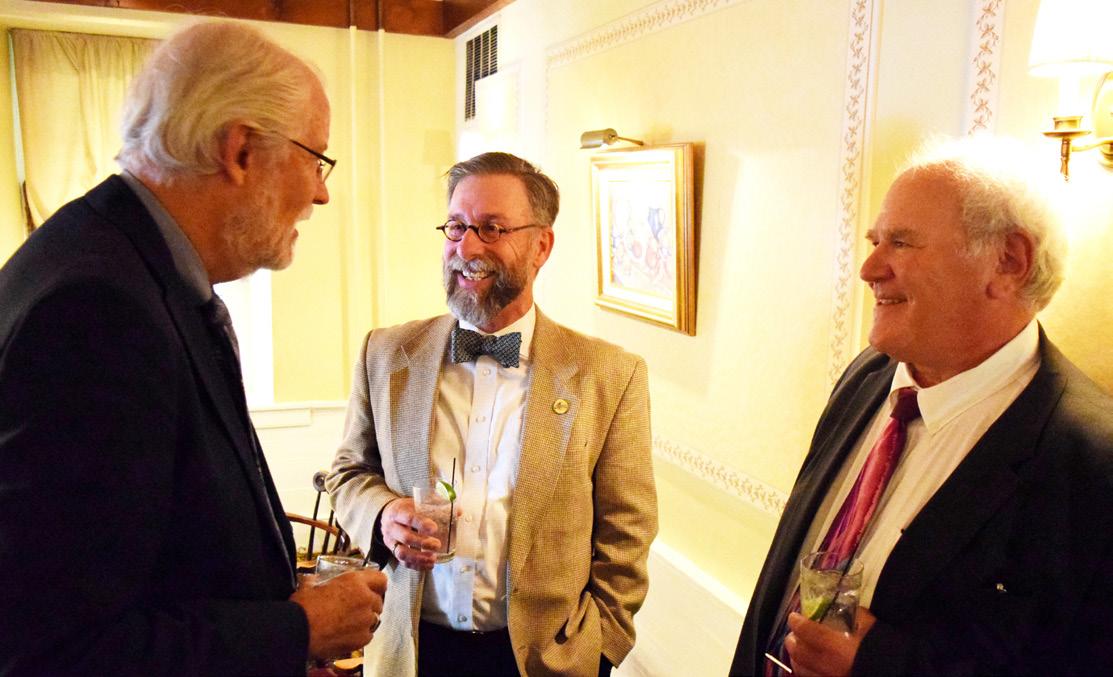

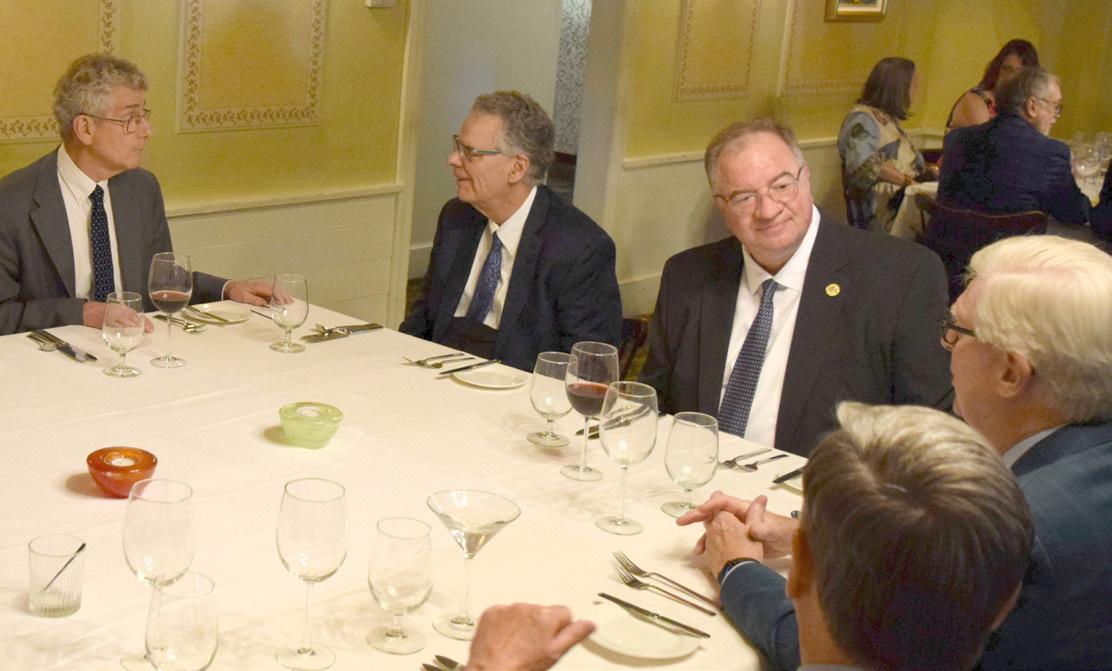


By Angélica Matías, Esquire

The phenomenon created by Benito Martínez Ocasio, who music fans know as Bad Bunny, has touched Puerto Ricans on the island and across the diaspora. I must admit that as a teenager back in the 1990s, I was not a fan of reggaeton. My musical preferences were shaped by my father’s love for boleros, salsa from the ’60s through the late ’90s, and traditional Puerto Rican music like trova1. My older sister, who is close in age to me, was a true fan of reggaeton from its early beginnings. But it was my younger sister who introduced me to Bad Bunny’s music a few years ago.
His early work, which leaned more toward trap, didn’t resonate with me at the time—it felt like music aimed at a younger generation. But everything changed in 2022 with the release of the album Un Verano Sin Ti2 By then, I had already joined the millions of Puerto Ricans who had left the island, becoming part of the Puerto Rican diaspora. The song Me Fui de Vacaciones3 struck a deep chord in me. It transported me to summers in Borinquen—the island—filled with music, family, and good times with friends.
On the eve of Three Kings Day this year, Bad Bunny released Debí Tirar Más Fotos4 and its companion visual project. As the most streamed Spanish-speaking artist on Spotify, with over 82 million monthly listeners, Benito now has an immense platform to showcase Puerto Rico to the world. Along with the music, he released a series of YouTube “visualizers” depicting vignettes of Puerto Rican history: the island’s attempt to declare independence from Spain on September 23, 1868 (El Grito de Lares), the U.S. military government from 1898 to 1900, and the signing of the Constitution in 1952.
These visualizers serve as history lessons for younger generations. They highlight our Indigenous Taíno5 heritage, the fight to preserve the Spanish language6, U.S. efforts to suppress our right to wave the Puerto Rican flag, and how reggaeton
traces its roots to African musical traditions from our ancestors such as bomba and plena. Through them, Bad Bunny is sparking international, intergenerational, and intercultural dialogue.
His concert residency in Puerto Rico, No Me Quiero Ir de Aquí, (I don’t want to leave this place) is more than a musical event—it’s a cultural movement. Beyond boosting the island’s economy, which remains under the supervision of a Financial Oversight and Management Board7, the residency has ignited a renewed sense of Puerto Rican national pride.
Let’s be clear: Puerto Rico is not sovereign. It remains a colony of the United States—a territory whose citizens have no plenary rights to self-govern and no voting representation in the U.S. Congress. Puerto Ricans are U.S. citizens by virtue of the Jones Act of 1917. And yet, Puerto Rico is undeniably a nation. Regardless of political affiliation—whether one supports statehood, independence, or the status quo—Puerto Rico meets the definition of a nation: a body of people united by birth, culture, race, language, and shared identity within a defined territory.
One of Bad Bunny’s recent songs, Lo Que Le Pasó a Hawaii, (What Happened to Hawaii) has become an anthem of Puerto Rican resilience and longing. It is both an ode and an elegy to the Puerto Rican experience. The song celebrates the beauty of the island and warns of threats—foreign investors trying to privatize public beaches, buying up land, and reshaping a place just 100 miles long and 35 miles wide. With over 13 million views on YouTube, the song resonates widely. Its cultural richness is evident not only in the lyrics and imagery but also in its sound. The YouTube visualizer features el coquí, the tiny frog endemic to Puerto Rico (and ironically also found in Hawaii). The musical arrangement includes traditional instruments like el cuatro and el güiro9, anchoring the song firmly in Puerto Rican folklore.
This album, the residency, the historical storytelling, and Bad Bunny’s unapologetic style have ushered in a new era of Puerto

Rican pride. From “the other side of the pond,” I feel it. I may not have gotten concert tickets, but I still feel the joy and the power of shouting with my fellow boricuas10 , “No sueltes la bandera, ni olvides el le lo lai!”11
Ms. Matías is an attorney in the Reading office of MidPenn Legal Services. The views expressed in the opinion are her own and not representative of any official position of MidPenn Legal Services.
References

1 Verse composition, commonly improvised, and accompanied by the Puerto Rican 10 string instrument, known as “cuatro”
2 A Summer without you
3 I went on vacations
4 I should have taken more photos
5 Taínos - island natives
6 For a detailed history of language in Puerto Rico, see Yo Soy ( I am): The Historical Trajectory of Language in Puerto Rico. Available at https:// guides.loc.gov/language-in-puerto-rico/english-language
7 “Gag Law” 1948-1957
8 Created in 2016 under the Puerto Rico Oversight Management and Economic Stability Act (PROMESA)
9 Word of Taíno origin describing a musical instrument
10 “Boricua” is a word commonly use to denominate individuals of Puerto Rican origin or descent, and is derived from, “Borikén,” the name given by the indigenous Taínos to the island.
11 Don’t let go of your flag or forget your roots. “le lo lai” is commonly used in traditional Puerto Rican music and was included in the chorus of the song “Lo que le pasó a Hawaii.”

When at their most vulnerable, your clients need a personal injury lawyer they can trust. With more than 40 years of experience, Dan will work to make sure your clients receive the help they need.
3 Auto Accidents
3 Construction Accidents
3 Premise Accidents
3 Insurance Disputes
3 Product Liability
3 Wrongful Death


The Hon. Eleni Dimitriou-Geishuaser presided over a naturalization ceremony that welcomed 56 new American citizens on July 30 in Courtroom 5A of the Berks County Courthouse. Officer for the United States Bureau of Citizenship and Immigration Services Tanairi Rivera presented certificates of citizenship to the newly naturalized citizens, who originated from 12 different countries, including Poland and Ghana. Berks Bar member Andrew C. Onwudinjo, Esquire, Partner at Krasno, Krasno, Onwudinjo, was the ceremony’s guest speaker and shared the story of his own immigration to America and honed in on the importance of the civic duties now imposed on the new citizens, including voting and jury duty. Many members of the community joined the celebration, including the Governor Joseph Hiester Chapter, Sons of the American Revolution, who presented the colors.




this
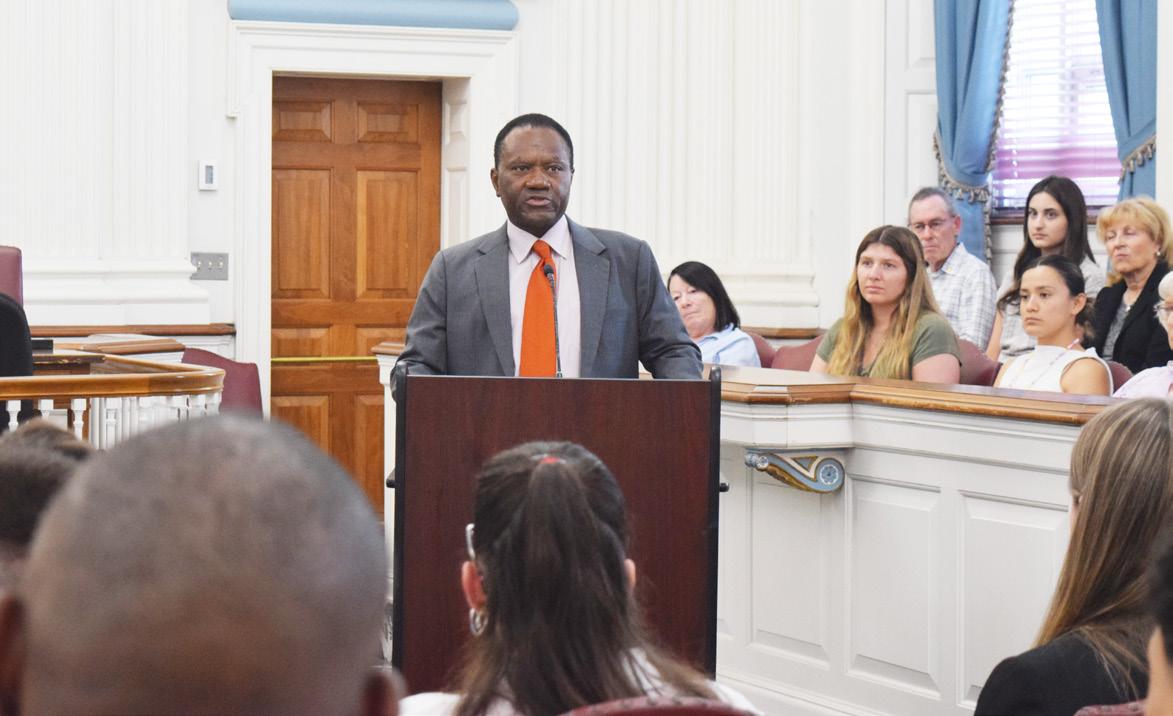
Guest Speaker, and Berks Bar member, Andrew C. Onwudinjo, Esquire, shares insight on all the opportunities available to the newly naturalized citizens—the same opportunities he gained when he was naturalized many years ago.


Immediate Past President Karen H. Cook addresses the new citizens and shares her excitement to see all they will accomplish and bring to the community.





The Law Foundation of Berks County and the PICPA’s Holiday Benefit Luncheon, which will be held on Friday, December 5th at the DoubleTree Hotel in downtown Reading, is always a success because of the dedicated and generous group of community sponsors. The Foundation expresses its gratitude for the continuous support from local businesses, donors, and organizations with the Mid-Year Sponsor Appreciation Reception, which was held on June 17 at the Berkshire Country Club. Gary Matthews (AKA Sarge), former outfielder for the Philadelphia Phillies and Chicago Cubs among others, was the evening’s special guest. Sarge fondly recalled his time in Philly in the early 1980s and touched upon his family’s legacy, including his son, Gary Matthews Jr., playing in the majors for several years. Many thanks to Connors Investor Services for once again sponsoring this year’s Mid-Year Reception.

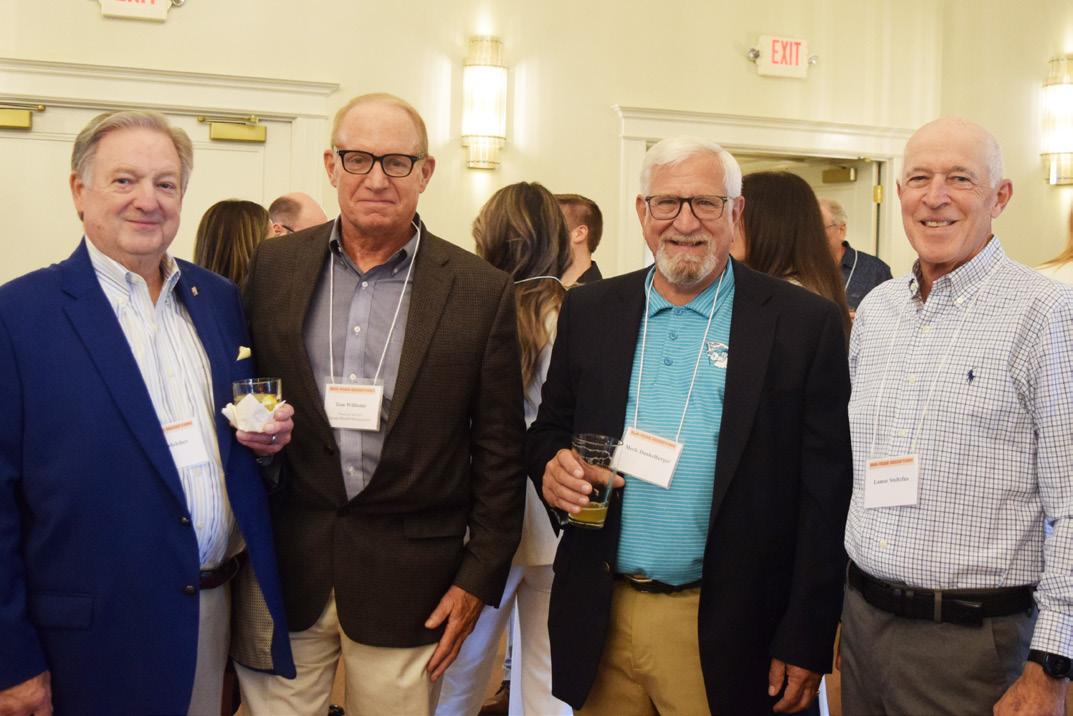

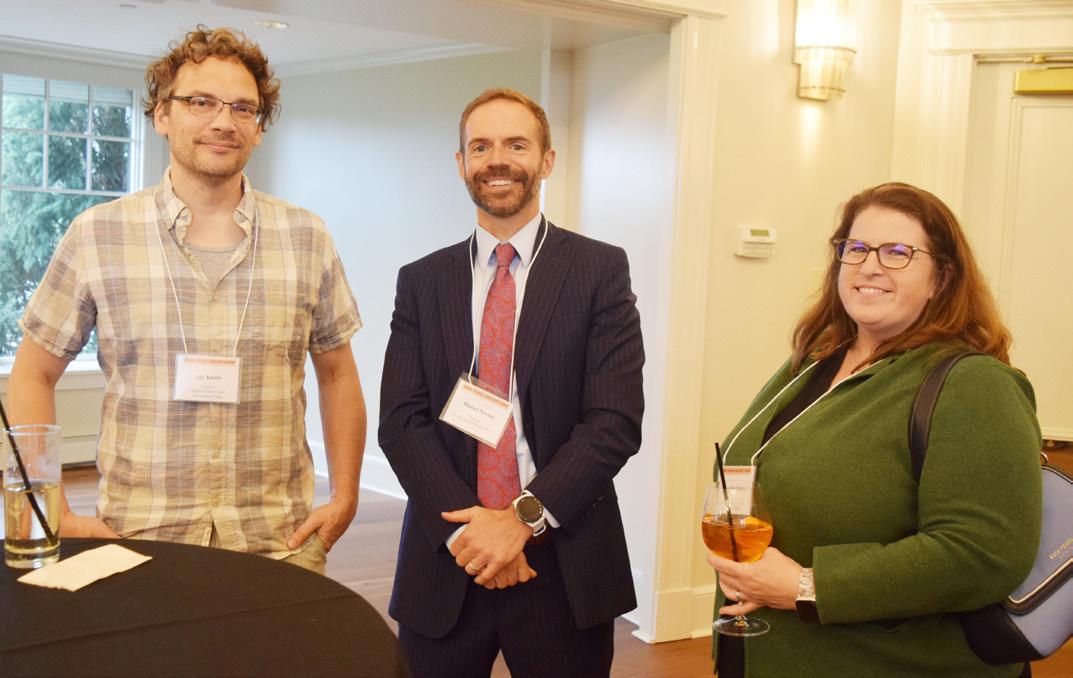

Director



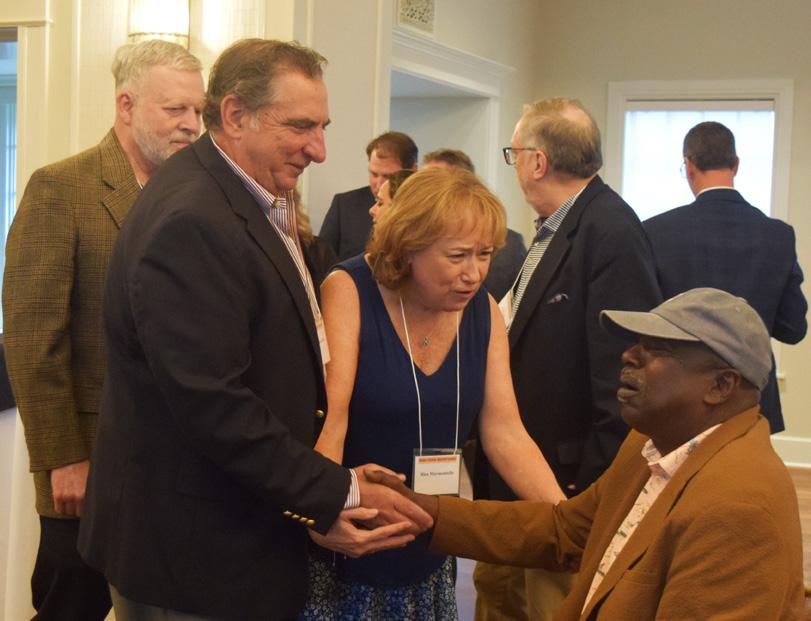

clients
On June 11, members boarded a bus in Exeter for a trip down 422 to Citizens Bank Park to watch the Phillies battle the Chicago Cubs. Members enjoyed the game from seats down the first base line in right field. The Phillies bats sizzled, leading the team to a 7-2 victory. A win always makes baking under the afternoon sun a little more bearable.



Members settle in for the ride to Citizens Bank Park.
Christie Billman, April Schmehl, Stephanie Nocera, Publications & Marketing Coordinator Courtney Morstatt, and Amber Moll.

The seats baked in the summer sun but provided a great view of all the action on the field.
By Hailey Fulmer


After a busy week representing clients in divorce and custody cases and attending municipal meetings at night, Philadelphia Eagles gamedays are sacred for Wyomissing attorney Kelsey Frankowski.
From September through February, Frankowski bleeds green as a Philadelphia Eagles superfan. When the Eagles play at home, Frankowski leads a legion of Birds fans from Berks County on a bus trip to Philadelphia.
No matter what kind of week it’s been at work, Frankowski is always energized on Sundays.
“So you might wake up on a Sunday morning, getting ready to go to the bus, kind of tired, but by the time you shower and have coffee, you’re buzzing, you’re ready to go,” she said.
The excitement of an Eagles gameday is something Frankowski learned from her dad, Walt, who is also an attorney and Berks Bar member.
As a young girl, Frankowski would join her dad as he watched the games on television in their Oley home. Her father was passionate about the team. Frankowski recalled her dad letting some profanities slip during heated moments of the game.
Before Kelsey and her sister were born, their dad had Eagles season tickets at Veterans Stadium, the venue for Eagles games until the early 2000s when the team moved to Lincoln Financial Field in south Philadelphia. He held on to the tickets for a few more years after his daughters were born. Frankowski recalled her dad’s reason for relinquishing the tickets because he thought: “Okay, no
continued on next page
Continued from page 27

more fun, time to be a dad.”
While her dad continues to root for the Eagles with the same passion he did years ago, Frankowski has started her own traditions during football season, including buying her own season tickets.
And there’s the bus trips.
The 37-year-old runs a bus for every home game bringing a lively atmosphere and relaxing ride down Route 422 for fans.
She inherited her bus duties from an elderly gentleman who ran trips for 14 years.
When Frankowski first started purchasing season tickets, she rode the bus as a patron and eventually began assisting him with the service. As the gentleman prepared to retire from organizing the trips, he asked Frankowski to take over— her enthusiasm and work to the organization made her qualified for the task.
It wasn’t an easy task for Frankowski to run the bus alone. Her initial thought was that she “didn’t have time for that.” But her passion for the team and the legacy of the bus were important, so she elicited help from her friends, including her business partner, Nicole Plank. Frankowski has been in charge of getting fans to and from games for 5 years.
Frankowski is not just your typical Eagles fan. She energizes other fans as an active member of their community.

On game day, she lifts spirits on the bus with a rousing rendition of the Eagles fight song, “Fly Eagles Fly.”
She’s even had to be resourceful when a blizzard almost forced her and a few other fans to miss a home game last season.
When the bus company canceled the trip to Philadelphia, Frankowski quickly found a driver willing to make the trek through the heavy snow. Donning snow pants, Frankowski recalled that her hearty group “just partied in the snow” that day.
The day in the life as an attorney is not boring for Frankowski, and it certainly isn’t as an Eagles fan. During the season, she sacrifices sleep to watch all 17 games whether the kickoffs are at 1 PM on Sunday or 8 PM on Thursday night.
“The football season isn’t a whole year, so you do get a break. And yet, towards the end of the year, I am ready for a break from doing all that,” Kelsey said.
Because of the Eagles’ success in recent years, that break doesn’t come until late January or early February.
This past season, Frankowski kept cheering until the final whistle of the Super Bowl in New Orleans as the Eagles won the NFL title for just the second time in franchise history.
Frankowski and her business partner, Plank, had made plans to attend the big game in The Big Easy before the Eagles won the NFC title.




You never know who you’ll run into on gameday outside Lincoln Financial Field. Frankowski met former Eagles wide receiver Irving Fryar in the bus parking lot prior to a game in January.
New Orleans is one of Frankowski’s favorite cities, so the excitement was beyond the football. With an Airbnb booked in a nice neighborhood, Frankowski turned her attention to finding tickets to the game.
Frankowski contacted her friend, who owned boxes at Lincoln Financial Field, to see what he could do to help them secure a ticket in New Orleans.
“I called him, and I was like, look, we need tickets to the game in New Orleans. What can you do for us? And he’s like, I don’t know, everything is pretty sold out. He called me back and was like, you have two minutes if you want these tickets. Here’s the row, here’s the price.”
Luck was on their side, and they secured seats about 15 rows from field level.
Frankowski recalled the electric feeling inside the Caesars Superdome and the surprising blowout victory for her Birds was a euphoric sensation she’s never experienced before as an Eagles fan.
For anyone planning to attend a Super Bowl, Frankowski recommends splurging for good seats, especially if you are rooting for your favorite team.
“We saw (Cooper) Dejean’s pick 6 and (DaVante) Smith’s 46-yard touchdown reception up close and personal,” Frankowski said. “Those are definitely plays that I will remember for the rest of my life!”
Fans should also research the many events leading up to the game to find out where they can meet current and former NFL players and pick up plenty of free swag, Frankowski said.
And one more tip: arrive early and stay an extra day if you can.
“Do not get into town on Friday and leave Monday. That is what everyone does and it is complete chaos,” she noted. “We got in on Thursday and left on Tuesday. We avoided a ton of traffic and lines at the airport, and we had a couple extra days to peacefully explore and enjoy the city before the massive crowds infiltrated.”
As the Eagles begin their season as defending Super Bowl champs, Frankowski is feeling excited and has no fears about a letdown.
“We have a really strong, healthy, confident and cohesive team, and I think we have a great chance of seeing a second consecutive Super Bowl victory,” she said.
And should the Eagles make a return trip to the championship game in Santa Clara, California in February 2026, Frankowski plans to be there cheering them on.
“I’ve already got automatic price updates being sent to me for flights to California,” she said.
Ms. Fulmer is a freelance journalist from Fleetwood pursuing a master’s degree in journalism at New York University.

Reviewed by
Brian C. Engelhardt, Esquire
By JOHN W. MILLER

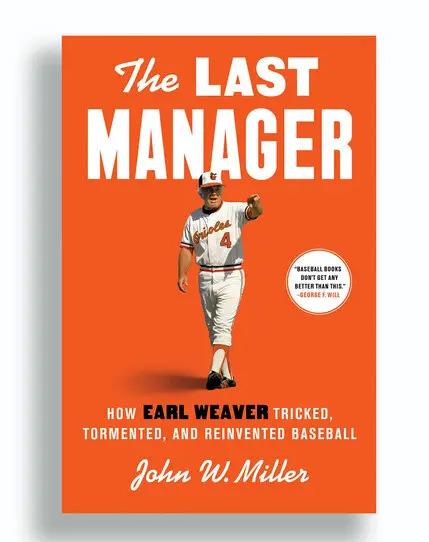
By SCOTT MILLER
As the current baseball season was just getting underway, baseball fans have been treated to the release of two (in the lingo of book reviews) excellent reads about baseball managers and managing. Coincidentally the author of each book is named Miller, though not related. This review of both books is a variation of the “Iron Man Stint” where a pitcher would throw both games of a double header. Rather frowned upon in the pitch-count-oriented culture of today’s game, it was last attempted by Don Newcomb of the Brooklyn Dodgers in a doubleheader sweep of the Phillies on September 6, 1950, in which he pitched a complete game shutout in the first game, and 7 innings of the second game, ultimately won by the Dodgers in the bottom of the ninth inning when Jackie Robinson scored on a throwing error.
“A manager’s job is simple. For 162 games you try not to screw up all that smart stuff your organization did last December.” — Earl Weaver
“The Last Manager,” by John W. Miller, is a biography of Earl Weaver, who managed the Baltimore Orioles from 1968 to 1982 and then again in 1985-86, leading the team to five 100win seasons, six American League East titles and four pennants, winning the World Series in 1970. Inducted into the National Baseball Hall of Fame in 1996, Weaver passed away in 2013.
Miller, who among other publications has written for the Wall Street Journal and the Baltimore Sun, is also a former Orioles scout, and successful Little League coach, does a superb job of not only recounting but also thoroughly examining all aspects of Weaver’s career, from his accomplishments – his .583 winning percentage is sixth highest among managers with 1,000 or more victories – to his famous on the field antics baiting and heaping abuse upon umpires, including kicking dirt on them.
The book begins by relating a particularly poignant episode in Weaver’s career when the young, scrappy, hustling St. Louis Cardinals’ prospect had assembled four fine seasons as a second baseman which resulted in his being promoted through five minor league levels in the Cardinals’ system over that time. After an outstanding spring training in 1952, the pudgy five-foot-seven Weaver indeed was this close to being the 25th player on the Saint Louis Cardinals roster, where he would be backing up Red Schoendienst at second base. This promotion to the major league roster assumed that Cardinals player-manager Eddie Stankey, also a second baseman but in the twilight of his career, would not keep himself as the backup infielder ahead of the 21-year-old prospect who had had such a fine spring.
Trying to squeeze out another big league season, Stankey kept the spot for himself as Weaver was sent to play second base for the Houston Buffaloes of the Texas League. Stankey was named National League Manager of the Year that season, batting .229 in 53 games (starting only six of them), as the Cardinals finished
in third place. Weaver plunged into a deep depression, seeing Stankey as having stolen a spot that was rightfully his, going on nightly alcoholic binges which resulted in his being sent down to a lower level in the minors until he finally temporarily controlled his drinking. Throughout the book Miller discusses how Weaver was plagued with alcoholism throughout his entire baseball career.
Weaver would never play in the big leagues and after several more years in the minor leagues would eventually move to coaching. In 1957 he was hired by Baltimore to manage the Fitzgerald Orioles in the Class D Georgia Florida League. Over the next decade Weaver would steadily move up in the Baltimore minor league system, managing at every level, including four years at Elmira in the Eastern League which resulted in a number of trips to Reading in 1963 and 1964 for games against the Reading Red Sox.
After two seasons managing AAA Rochester, Weaver joined the coaching staff of the major league Orioles in 1968, two years after the team won the World Series under Hank Bauer. The next season during the All-Star break, the 37-year-old Weaver replaced Bauer, who had managed the Orioles to a losing record and a sixth place finish the previous season, and had the team barely above .500 that year. The Earl Weaver era in Baltimore had begun.
The book discusses in some detail Weaver’s intuitive principles that in many ways were consistent with the analytics that have come to dominate modern day baseball. At the top of his priorities were throwing strikes, getting on base and excellent defense. Platooning was also something Weaver did effectively, extensively compiling statistical performances of players to match up players’ strengths to address situations. Miller summarized this, stating: “Once computers came along, you didn’t even need a manager anymore. You could just program them to think like Earl Weaver.”
Millier’s commentary is by no means all clinical. He relates how Weaver had a unique style with reporters, often conducting post-game interviews while drinking beer, having a cigarette and having his post-game meal, while throwing out zingers like, “We’re so bad right now that for us, back-to-back home runs means one today and another one tomorrow." Miller includes many of these classic Weaverisms, among the most prominent being, “The key to winning baseball games is pitching, fundamentals, and three-run homers.” A favorite of mine came when a player Weaver considered to be overly religious, told him that he wanted to walk with the Lord. Weaver’s response: “I’d rather you walk with the bases loaded.” Another conversation with the same player came after he hit a home run and told Weaver that God had been watching out for him. Weaver’s response: “We better not be counting on God. I ain’t got no stats on God.”
The portrait of Weaver that Miller paints discloses his many flaws. He was an alcoholic (having a record of two D.U.I. convictions), an inveterate gambler (but not on baseball, apparently) and regularly used profanity. Nonetheless Miller brings to light Weaver’s strong points: a work ethic, that he was truly color blind in his treatment of African American players (for years he championed Frank Robinson becoming a manager, which
Continued from page 31
came to fruition in 1975 when Robinson was hired as manager of the Cleveland Indians, becoming the first African American) and a charm about him which, though being somewhat of an acquired taste, gave him a folk hero status in Baltimore which lives on.
Miller accomplishes this without getting too enmeshed in baseball technicalities and statistics, which as bones and muscle that are needed in any work involving baseball, still don’t get in the way of a very engaging story of the man who, shortly after taking over the Orioles, hung a sign in the clubhouse that read, “It’s what you learn after you know it all that counts.”
It’s not only a must read for Oriole fans – hearkening back to days of glory which will be somewhat of an antidote to the current season they are suffering through – it is a great read for anyone who enjoys baseball.
“The secret of successful managing is to keep the five guys who hate you away from the four guys who haven’t made up their minds.” — Casey Stengel
“Skipper: Why Baseball Managers Matter (and Always Will),” by Scott Miller, is an overview of what the role baseball managers used to play, currently play and will play, in a game that on one hand seems timeless, and on the other hand continues to change. Each chapter examines an aspect of managing in the game – including relations between players and managers, issues in promotion of African Americans to managerial positions, the increased role of analytics in game and team strategies, increased involvement of the front offices in making decisions that used to be the sole domain of the manager, changes in how a manager of today needs to react to just about everything – as seen through four days spent with highly successful Dodger manager Dave Roberts, and how background qualifications for major league managers have changed (as in so many of them now get the job with no managing background). It is a work on baseball managing discussing how and where, “old school” meets the “new school” and the results.
All of this comes from the exhaustive efforts of author Scott Miller, who, aside from extensive research, conducted hundreds of interviews with various managers, former managers, players, former players, baseball executives, and former baseball executives, in which he compiled insightful discussions of the various subjects. In addition to looking at all facets of the issue, the discussions contained candid opinions of those interviewed that often conflicted with opinions of others involved in the same discussion. The discussions and interviews also frequently involved humor, human nature being what it is, which relieve some tensions that arose from conflicts.
Sadly, Scott Miller died this past June from pancreatic cancer at the age of 62 only five weeks after the publication of this book. During his career he wrote about Major League Baseball for more than 30 years, contributing to The New York Times, Bleacher Report, the Los Angeles Times and other publications. He also served as analyst on MLB Network Radio.
In writing about how, “Managing always has been the industry’s loneliest job,” Miller stated. “It’s just lonely today for different reasons.” Analytics that began to be adopted in earnest with the popularity of the book of “Moneyball” in 2003 (and film in 2011) which caused business models in baseball organizations to be modified – such as baseball organizations adopting business models.
Miller thoroughly explores how the decisions that had once been the exclusive domain of the manager, in the days when managers such as Earl Weaver and Tom Lasorda roamed the earth, have been taken out of manager’s hands and are now made by the front office. One result of this that Miller points out is that several teams now having organization staffers with an office in the clubhouse, which used to be the manager’s exclusive territory. Also, many front offices now frequently include members having degrees from Ivy League or other exclusive colleges.
The book is full of anecdotes illustrating the changes in the game. Miller provides an example of “old school” managing in his interview with Tom Kelly about game 7 of the 1991 World Series, when Kelly had to decide whether Jack Morris, who had thrown nine shutout innings, should be lifted from the game. When asked about how much he had left in his tank, Morris told Kelly, “I can pitch,” with Kelly replying, “Oh, hell, it’s only a game.” Morris then retired the three Atlanta batters he faced in the tenth inning, with the Twins scoring in the bottom to win 1-0. Kelly went with his gut and what he saw from Morris at that time.
A contrasting result was the subject of Miller’s interview with Tampa Bay manager Kevin Cash, who with one out in the sixth inning in game six of the 2022 World Series (in which the Dodgers held a 3 games to 2 lead) and Tampa leading by one run, removed starting pitcher Blake Snell who at that point had allowed two hits and struck out nine batters. However, with one man on and Mookie Betts at the plate, to be followed by the top of the batting order who would be facing Snell a third time, Cash lifted Snell. This was consistent with a plan developed between Cash and the baseball operations department that Snell should not face the Dodgers lineup three times (apparently whether or not he had surrendered only two hits in six innings with nine strikeouts).
The plan didn’t work. Tampa’s bullpen allowed three Dodger runs over the balance of the game, and the Dodgers won the game and the World Series. Criticized after the game for making the decision, but not within his own organization, Cash is now the longest tenured active manager.
Miller discussed in some detail (no doubt painful for Red Sox fans) an “old school” decision made by Boston manager Grady
Little to allow Pedro Martinez to continue to face the Yankees in the 8th inning of game 7 of the 2003 ACLS with Boston leading 5-2. Although Martinez was known to weaken later in games and had already thrown 100 pitches going into the inning, Little believed his bullpen was tired and went with his gut on a hope that Martinez would be able to last beyond his usual capabilities. After getting the first batter on seven pitches, Martinez threw another sixteen pitches out of which the Yankees hit a single and three doubles, at which point Little lifted him. By that time the Red Sox lead had evaporated, with the Yankees ultimately winning in the bottom of the 11th inning on Aaron Boone’s home run. The game ended early Saturday morning. Little was fired Monday.
A particularly compelling chapter concerned a lack of Black managers in baseball as well as problems finding another managerial job after having been dismissed. In examining the issues Miller interviewed Dusty Baker as well as Cito Gaston and Lloyd McClendon extensively.
There is humor that emerges from many of the interviews – much of it self-effacing by the respective interviewees. One example was Billy Beane, the former Oakland General Manager and architect of Moneyball, whose A’s teams were eliminated in the first round of playoffs four years in a row after posting superb records during the regular seasons (two of which were more than 100 wins), frustrated by what Miller termed, “the utter randomness of a short post-season series…Raged in a quote for the ages, ‘My s--t doesn’t work in the playoffs. My job is to get us to the playoffs. What happens after that is f------g luck.” To this Miller added the observation, “Many analytics-heavy teams over the years, most recently the Dodgers and Rays, know that all too well.”
Phillies fans at this point may be wondering what Miller had to say about Rob “Topper” Thomson (whose .575 winning percentage as of August 15 is good enough for 15th on the list of all-time managers with more than 100 wins). Thomson is only mentioned once, and that is in connection with his relationship with Dave Dombrowski, who Miller describes as an executive “who continues to give managers space while running the Phillies.” Miller goes on to say how Dombrowski has a history of giving managers space, citing examples of how he has worked with Jim Leyland in Florida as well as in Detroit with great success. (One World Championship with Florida in 1997, and two World Series runs with the Tigers – losing to St. Louis in 2006 and to San Francisco in 2012).
A few more words about Topper, in connection with Earl Weaver. Weaver’s organizational skills in methodically planning the daily Orioles spring training regimen was reminiscent of that of Thomson, who told us at last year’s Holiday Benefit Luncheon that his efficiency inspired his then-boss Yankees Manager Joe Torre to call him “Topper” because he was always “on top of things.” I’ve still not seen Topper kick dirt on any umpires.
Miller’s weaving together past baseball history into what the game is becoming today presents not only an engaging narrative but also challenges the reader to evaluate where technology has caused changes to improve the game. Or is the elimination of the
STATEWIDE PENNSYLVANIA MATTERS NO CHARGE FOR INITIAL CONSULTATION
Representation, consultation and expert testimony in disciplinary matters and matters involving ethical issues, bar admissions and the Rules of Professional Conduct
• Judge, Court of Judicial Discipline
• Former Chairman, Judicial Conduct Board of Pennsylvania
• Former Chairman, Disciplinary Board of the Supreme Court of Pennsylvania
• Former Chairman, Continuing Legal Education Board of the Supreme Court of Pennsylvania
• Former Chairman, Supreme Court of Pennsylvania Interest on Lawyers Trust Account Board
• Former Federal Prosecutor
• Selected by his peers as one of the top 100 Super Lawyers in PA and the top 100 Super Lawyers in Philadelphia
• Named by his peers as Best Lawyers in America 2022 and 2015 Philadelphia “Lawyer of the Year” Ethics and Professional Responsibility Law and Legal Malpractice Law
1500 Market Street, East Tower, Suite 1800 • Philadelphia, PA 19102 (215) 751-2863
human factor something that will cause the game to further lose the charms it still has. He accomplishes this with objectivity but shows some sympathy for the loss of the “old school” manager – not unlike the emotions evoked in the last scenes in “Lonely Are the Brave,” as Kirk Douglas and his horse fight against traffic attempting to make their way across Highway 66.
Miller’s final contribution to baseball writing is one that is to be appreciated. He will be missed.
Note: For those who were curious, the last time a pitcher successfully accomplished the Iron Man Stunt was on August 28, 1926, when Emil “Dutch” Levsen of the Cleveland Indians defeated the Boston Red Sox before a Fenway Park crowd of 5,000 by scores of 5-1 and 6-1, allowing four hits in each game. Hopefully this attempt at the Iron Man Stunt will be viewed as achieving success equal to that achieved by Dutch Levsen 99 years ago.
Mr. Engelhardt retired from BB&T’s Legal Department and is a regular contributor to The Berks Barrister and the Berks County Historical Review. He has written for a number of publications by the Society for American Baseball Research and is the author of the insightful and dynamic, Reading’s Big League Exhibition Games.



Bar members braved the misty, rainy morning for this year’s Pets at the Park event, hosted by the Wellness Committee. Members, their families, and their pets gathered at Muhlenberg Township’s Jim Dietrich Park on June 7 to enjoy a late morning meet up with their four-legged companions. The Perk Up Truck provided delicious treats, from coffees and smoothies to even puppichinos for the dogs. This year’s event featured some friendly competition for the dogs as members voted for their favorite four-legged contestants in the following categories: Best Manners to MDJ Eric Taylor’s dog Bambi, Best Groomed to Bradley and Taylor Davis’ dog Roo, and Best in Show to Courteney Hahn’s dog Mia.


Everyone had a fantastic time and braved the rainy weather for some coffee and time with their pets and fellow members.


The Bar Association staff and volunteer attorneys were busy this summer getting out in the community and spreading the word about how our members can help the community and individuals who need legal services. On Saturday, June 21, members walked as part of the Berks Bar Team for the Safe Berks Walk for NO MORE, and then in the afternoon, the Bar Association had a table and handed out information on available legal services in the county at West Reading’s Art on the Avenue. Then, on June 28, Bar Association staff and members participated in the NAACP Community BBQ to promote Jury Diversity.

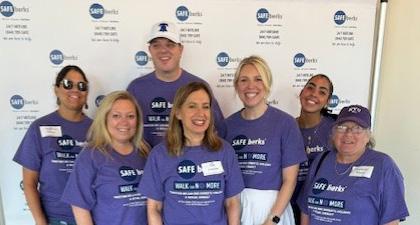
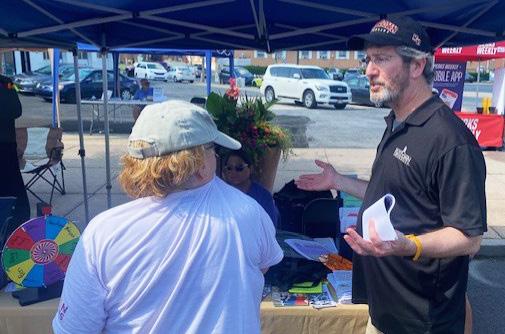

place after the Safe Berks Walk.



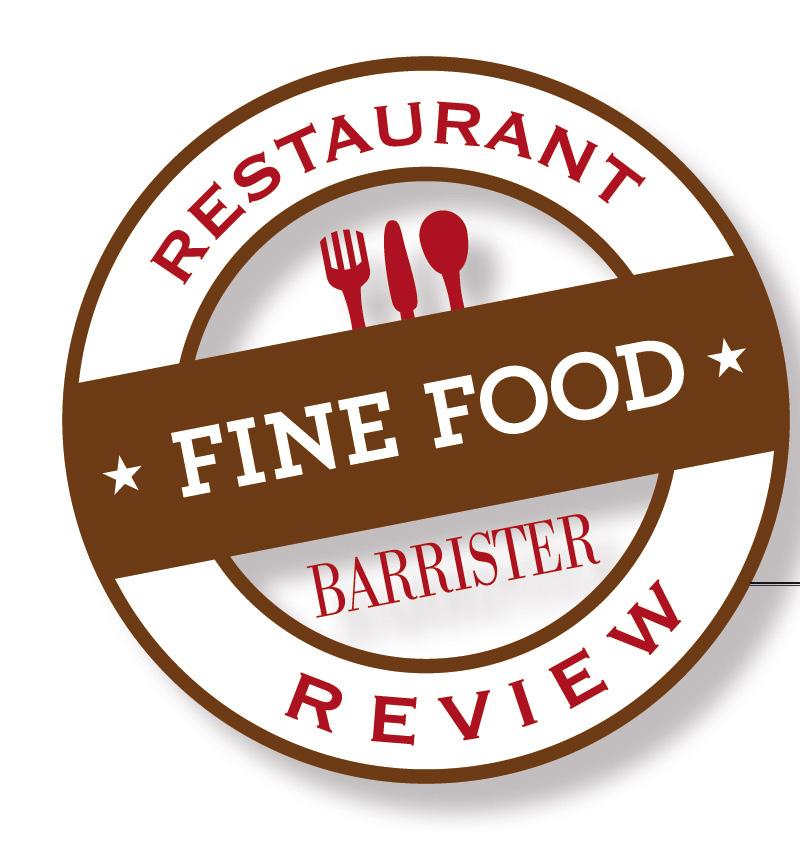
By Susan N. Denaro, Esquire

One mark of a great meal, to me, is how often I revisit the memory of it and the emotions that memory evokes. Sometimes a lingering memory may only focus on the other people at the table and the fellowship enjoyed. Other times, it may revolve primarily around the food and ambience. Only the truly special meals evoke memories of all of those elements. A recent dinner at the Birchrunville Store Café (the “Birchrunville”) in West Vincent Township, Chester County was about as righteous as a meal gets.
Birchrunville is about a half hour car ride from Wyomissing and we arrived about 10 minutes early for our second seating reservation. Because the table was not vacant, the hostess, who appeared to double as a server, suggested we sit on the porch and enjoy one of the cocktails we were toting. Glasses, ice, ice bucket, corkscrew, whatever we needed, was instantly produced. Just as we were settling in, our table was ready along with another ice bucket for our white wine.
The dining room features rough-hewn wooden floors, exposed brick, and tables rather close to one another. According to the café’s website, the building first served as a creamery. Over time, it became a general store and post office, which continues to serve residents of northern Chester County. The general store gave way to a café sometime in the 1970s, according to its website. And Chef Francis launched the current iteration of the café in 1999. Hanging on the walls are “historic photos and memorabilia, paying homage to the building’s rich heritage,” the website notes.
The current use as a BYOB restaurant featuring a good mix between French and Italian fare is perhaps the building’s highest and best use. Reservations are a must and, as is the current trend in better restaurants where demand far exceeds the supply of tables, there are two dinner seatings, and each party is allotted no more than two hours for their repast. Fortunately, the friendly staff keeps the service flowing so the meal doesn’t seem rushed so that you may savor each bite.



While it is not billed as a farm to table establishment, the menu appears to change frequently and the fare appears to be inspired by whatever is in season. Luckily, we were there on a night fresh figs were in season and featured in three of the dishes our merry little band of four ordered.
Although August is a month without an “R” in it and there is a rule about not eating oysters in those months, we tempted the fates and started with oysters from Virginia prepared two ways: the first version was served raw with a vibrant black pepper mignonette, and the second was baked in a clams casino style with a healthy smear of blue cheese. The oysters were a little on the small side, which I prefer, and were simply yet beautifully plated. While both varieties were excellent, the red wine vinegar in the mignonette had such a nice finish to it we ordered a second round of the raw oysters.
What promptly followed was a volley of appetizers that were shared by all of us. Perhaps the best of them was a seafood strudel in a sweet lobster in a red curry emulsion. The slice of that buttery thin pastry overflowing with succulent lobster played well with the fire engine red-colored sauce. I was concerned that the spice level of the curry might overwhelm the delicateness of the stunning slice of strudel, but I was wrong. Best described as a lobster roll on steroids, it is a dish that must be ordered every time it’s on the menu.
Italian San Marzano tomatoes were the basis of a rich tomato bisque that was all a proper tomato soup should be. While the soup could have been classified as perfection unadorned, a warm goat cheese souffle floating in the middle of the bowl elevated it to a whole new level. The souffle was light yet had that sharp salty bite of a good quality cheese. The inventiveness of putting
something as light as a souffle in a dense soup was a perfect paring and left all of us saying, “Move over tomato soup with a grilled cheese sandwich.”
The first appearance figs made on our table was in a dish with burrata, roasted red beets, and peaches. The dish was drizzled with a deep-green, fresh pesto, and was dotted with pistachios. While I have enjoyed figs with burrata and peaches before, I have never thought to add red beets or pesto into the mix; the combination worked on every level. Like the other dishes before it, the proportion of the cheese to the rest of the features on the dish was pitch perfect and the plate was scraped clean by the time our server returned to retrieve it.
The second dish with figs was a trio of roasted figs stuffed with blue cheese and a spear of bacon. The salty and sweet flavors of the offering played well together. The real surprise was the use of the larger white figs instead of the smaller red mission figs. If given the choice, we prefer white figs as we find them a little less sweet.
Just when we were thinking we could not eat another bite, the entreés arrived. Our son ordered the sushi grade Japanese Madai red snapper niçoise with squid ink pasta which he described as a do-again. My spouse enjoyed every bite of his Angus strip steak that was cooked precisely to his requested doneness and served with pommes rissoles (potatoes with bacon). The dish was a classic and made my meat and potato-loving partner very happy. Our friend ordered the boneless duck breast stuffed with sweetbreads and figs wrapped in crispy pancetta. While duck in a fruit sauce is typical, the use of those figs and sweetbreads are anything but. He described his choice as something akin to a Siren’s call that will have him return soon.
continued on next page
Continued from page 37
While I enjoyed a bite of everyone else’s entrée, I regretted trying them as it meant I had to in turn share my veal tenderloin with porcini risotto and oyster mushrooms in a masala reduction. The fork-tender veal was cut more like a thick slice of beef tenderloin than the scallopini-sized slice I expected. The risotto was cooked al dente, and the chef sauced the dish with just enough that the dish was not swimming in it but there was still enough sauce to have some in every bite. Because we ordered so many starters, and despite having to pass my plate around the table, I managed to carry home a reasonable portion of it and found it just as soul-satisfying for lunch the next day.
The friend who introduced me to Birchrunville says its desserts are not to be missed and she is spot on with that advice. We ordered three to share: A chocolate lava cake with a scoop of ice cream, a mango bombe encased in a thin chocolate coating and floated on a delicate custard sauce, and a butterscotch cake served with a scoop of vanilla gelato. They were all excellent, but it was that butterscotch cake, which was somewhat reminiscent of a sticky toffee pudding, that stole the show.
If you are looking for a memorable experience off the beaten path, where you don’t have to dress to the nines, but the food and the service are the height of perfection, get to the Birchrunville Store Café.
Ms. Denaro is with the Wyomissing firm Plank Frankowski.



Fresh figs appear in several dishes, including this one with burrata, roasted red beets and peaches drizzled with fresh pesto and dotted with pistachios.

The fork tender veal tenderloin with porcini risotto and oyster mushrooms is so good you won’t want to share it with the rest of your table.

Hoodies and jackets were more appropriate attire than swimsuits for the bar association’s Pool Party on May 24th at FirstEnergy Stadium. Nearly 50 members and their families bundled up while watching the game and grabbing some burgers, hot dogs and other ballpark fare.








Zach Hobart takes a short break from his group sales internship with the Fightin’ Phils to catch up with his mom and bar member, Alisa, and dad, Chuck. Special thanks to Zach for helping the bar get tickets in the pool area.


